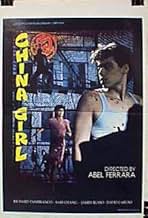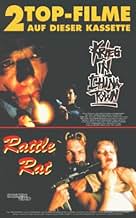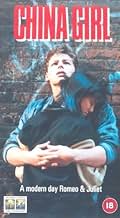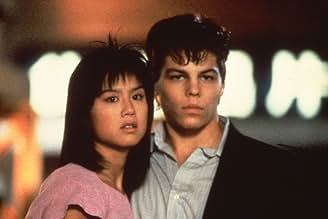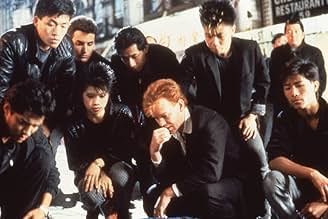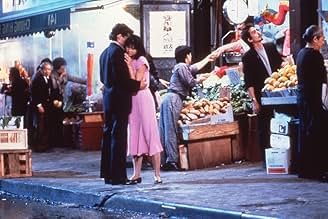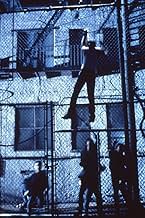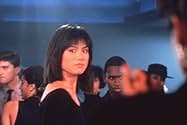China Girl
- 1987
- Tous publics
- 1h 30m
IMDb RATING
6.3/10
2.7K
YOUR RATING
An Italian boy and Chinese girl fall in love in New York, igniting a conflict between their ethnic gangs.An Italian boy and Chinese girl fall in love in New York, igniting a conflict between their ethnic gangs.An Italian boy and Chinese girl fall in love in New York, igniting a conflict between their ethnic gangs.
- Awards
- 1 nomination total
- Director
- Writer
- All cast & crew
- Production, box office & more at IMDbPro
Featured reviews
Ferrara's China Girl, like many other films by the director, namely The king of new york and The funeral, is not afraid to approach tough political themes but also like these films just mentioned above is insufficient in its discourse and not captivating enough to make the viewer actually care about these issues.
The whole plot and message relyes on the relationship between Tony and Tye , the problem is that even though that is the case the film barely shows them bonding and falling for each other and we are just supposed to believe that they love each other even though the movie give us no reason whatsoever why they should. That for me is the biggest reason why the film is insufficient in its message and ends up just leaving the viewer indifferent to the issues there presented. With that said, it's not a bad movie, it has it's charm.
In the 80's, in New York City, the teenager Anthony "Tony" (Richard Panebianco) lives in Little Italy and works making pizza dough in a pizzeria. He goes to a nightclub, where he meets the gorgeous Chinese teenager Tye (Sari Chang) and they dance together. However the Chinese street gang led by Tsu Shin (Joey Chin) chases him, but he is saved by the Italian gang led by his older brother Alberto "Alby" (James Russo). Meanwhile Tsu Shin decides to blow-up a Chinese restaurant in Little Italy with two other gang members against the will of Yung Gan (Russell Wong), who is Tye's brother and real leader of the gang. His action provokes the wrath of Mr. Gung Tu (James Hong), who is the lord of the Chinese mafia. On the other side, Alby, his right arm and friend Mercury (David Caruso) and their gang decide to go to Chinatown in reprisal to the Chinese attack and the Italian mobster Enrico Perito (Robert Miano) warns them to respect the boundary of their neighborhood since there is a mafia agreement of the leaders. However Tony and Tye fall in love with each other and keep secretly seeing each other in the middles of the conflict between gangs with tragic consequences.
"China Girl" is probably one of the most commercial work of Abel Ferrara. Nevertheless it is a great film supported by magnificent direction and top-notch performances. The story of love and ethnic prejudice in tow close communities in New York City, Little Italy and Chinatown, slightly recalls the storyline of "Romeo and Juliet" and is closer indeed to the "West Side Story". Richard Panebianco and the gorgeous Sari Chang stopped their careers in the middle 90's despite their great performances. Last but not the least, thirty years after its release, "China Girl" has not aged and is still worthwhile watching. My vote is eight.
Title (Brazil): "Inimigos Pelo Destino" ("Enemies by Destiny")
"China Girl" is probably one of the most commercial work of Abel Ferrara. Nevertheless it is a great film supported by magnificent direction and top-notch performances. The story of love and ethnic prejudice in tow close communities in New York City, Little Italy and Chinatown, slightly recalls the storyline of "Romeo and Juliet" and is closer indeed to the "West Side Story". Richard Panebianco and the gorgeous Sari Chang stopped their careers in the middle 90's despite their great performances. Last but not the least, thirty years after its release, "China Girl" has not aged and is still worthwhile watching. My vote is eight.
Title (Brazil): "Inimigos Pelo Destino" ("Enemies by Destiny")
China Girl was a hip and very violent movie, I wish I saw at the cinema, when I had the chance. Italian boy falls for Chinese Girl-true romance, a reciprocated love. Now, here's the impasse: they're both related to warring gangs, even though the Italians, really the good guys, do have it in for the Chinese, where this Chinese Gang are part of a mafia, merely puppets on a string. When the Italian boy, Gino (an impressive Richard Panebianco) narrowly escapes having his lights punched out, when chased by the Chinese gang, the head the lovestruck girl's brother, this doesn't detur him or her, from further progressing the relationship, where they keep sneaking off like little children, despite warnings from their older protectors. As Wong, an Asian actor I love watching, says to her little Sis, Thai (an equally impressive Sari Chang) "You don't understand, you're nothing but a chink to them". I appreciated Wong's honesty, here, where honor runs high among this race. Wong was never truer in his words, too. Gino's older brother, Alby, and his friends are racist goons. In particular is red haired Caruso, who I loved in this, despite playing a d..khead immature character of loathing. One scene has him ordering egg rolls, while disrespectfully making squinting eyes at some Asian cooks nearby, while also insulting the ones serving him. Now that's a d..khead. Panebianco sets him straight defending the Chinese, where a physical fight almost ensues. It would of been good to see how it ended up, if Russo hadn't stepped in, but we know all too well, that Caruso would of one won, ending this conversation by getting Panebianco in a headlock, simmering him, then cutting him loose, where Panebianco would of just shrugged him off, and walked away. It is too, the worst fitting time, for these gangs to be in an escalating turf war, a war which of course, is also personal, caused by our love struck duo, as the Asian and Italian mafia head are trying to make a peace, a business negotiation. This is complicated by the arch enemy gangs, feuding, the main plot of the story, which I really liked. China Girl has great pumping music, it's finale song, I loved, after one of the most memorable and tragic climaxes I've seen. It's a simple message told throughout it's story, the consequences of hate and racism, that we don't just have to view it on screen. The exterior shot settings of Chinatown, and the Italian hood are well chosen. This Romeo and Juliet tale, minus the happy ending, but with stylized violence, a plus, has some great action sequences, one involving a shootout I loved, that ended with Caruso's crazed look, as he mouthed "Mother fu..ers" through clenched teeth. China Girl has it all, where the action/blood craving viewer will get his three dollars worth. One of the '88 movie treats. One of Ferrara's best. Personally, China Girl is his favorite, in his list of filmographies.
William Shakespeare's eternal tale of young love gets yet another version in China Girl. Despite the racial tensions between the Chinese of Chinatown and the shrinking Italian population of Little Italy, Sari Chang and Richard Panebianco find each other and find love. Now if only those who might become their prospective in-laws will stop the hate.
China Girl was filmed completely on location in New York's neighborhoods of Little Italy and Chinatown. As the film says Little Italy where the fabled fictional Godfather had the Genco Olive Oil company is shrinking block by block as the Italians move out and a huge influx of Orientals move in and expand Chinatown. China Girl was done in 1987 so in twenty years the trend is exacerbated.
Players like James Russo, Russell Wong, and David Caruso have all gone on to bigger and better things, they're certainly more known than the leads are now. Still Panebianco and Chang are an attractive pair of kids.
The soundtrack is typical music from the Eighties in keeping with the times. Don't expect any songs for the ages like there were in West Side Story.
China Girl is a nice retelling of Romeo and Juliet a story that as long as there's life on planet Earth will never go out of style.
China Girl was filmed completely on location in New York's neighborhoods of Little Italy and Chinatown. As the film says Little Italy where the fabled fictional Godfather had the Genco Olive Oil company is shrinking block by block as the Italians move out and a huge influx of Orientals move in and expand Chinatown. China Girl was done in 1987 so in twenty years the trend is exacerbated.
Players like James Russo, Russell Wong, and David Caruso have all gone on to bigger and better things, they're certainly more known than the leads are now. Still Panebianco and Chang are an attractive pair of kids.
The soundtrack is typical music from the Eighties in keeping with the times. Don't expect any songs for the ages like there were in West Side Story.
China Girl is a nice retelling of Romeo and Juliet a story that as long as there's life on planet Earth will never go out of style.
Chinese gangs vs. Italian gangs in NYC in 1987. Tony (Richard Panebianco) and Tye (Sari Chang) meet and fall in love. Meanwhile Tye's brother hates all Italians and Tony's friends hate Chinese.
If you've seen "West Side Story" you know how this ends--but a bit more tragically in this movie. Plotwise it's very obvious but it's beautifully done. Filmed with energy, beautifully atmospheric (the sets and lighting are incredible), and full of bursts of ultraviolence. Most of the roles are well acted, especially by James Russo, David Caruso (chewing the scenery) and Russell Wong. As the young lovers Panebianco and Chang are, unfortunately, not that good. In a way it's understandable--he was only 16 when this was made and it's the first role for both. They're both very attractive (Panebianco is pretty buff with a baby face; Chang is delicate and beautiful) but have little to do other than kiss and act like they love each other. That isn't believable either since they have zero sexual chemistry. Still, they are sympathetic characters. Also, in a nice touch, Panebianco shows more skin than Chang in their sex scene.
This is really obscure and it doesn't deserve it. It had almost no release in 1987 (there were no stars to sell it) and was never a big hit on cable or video. Also Chang never made another movie and Panebianco disappeared after making a few more films (Whatever happened to him? He showed a lot of promise.). That's too bad--this deserves a bigger audience. Worth watching on cable or renting.
If you've seen "West Side Story" you know how this ends--but a bit more tragically in this movie. Plotwise it's very obvious but it's beautifully done. Filmed with energy, beautifully atmospheric (the sets and lighting are incredible), and full of bursts of ultraviolence. Most of the roles are well acted, especially by James Russo, David Caruso (chewing the scenery) and Russell Wong. As the young lovers Panebianco and Chang are, unfortunately, not that good. In a way it's understandable--he was only 16 when this was made and it's the first role for both. They're both very attractive (Panebianco is pretty buff with a baby face; Chang is delicate and beautiful) but have little to do other than kiss and act like they love each other. That isn't believable either since they have zero sexual chemistry. Still, they are sympathetic characters. Also, in a nice touch, Panebianco shows more skin than Chang in their sex scene.
This is really obscure and it doesn't deserve it. It had almost no release in 1987 (there were no stars to sell it) and was never a big hit on cable or video. Also Chang never made another movie and Panebianco disappeared after making a few more films (Whatever happened to him? He showed a lot of promise.). That's too bad--this deserves a bigger audience. Worth watching on cable or renting.
Did you know
- TriviaOut of all of the films he has directed, Abel Ferrara has stated that "China Girl" is his favorite.
- Crazy creditsAfter the credits there is a line: Dedicated to the people of Chinatown and Little Italy.
- Alternate versionsThe UK video version was cut by 7 seconds to remove the use of a butterfly knife. The Columbia DVD features the same cut print.
- How long is China Girl?Powered by Alexa
Details
Box office
- Budget
- $3,500,000 (estimated)
- Gross US & Canada
- $1,262,091
- Opening weekend US & Canada
- $531,362
- Sep 27, 1987
- Gross worldwide
- $1,262,091
- Runtime
- 1h 30m(90 min)
- Color
- Sound mix
- Aspect ratio
- 1.85 : 1
Contribute to this page
Suggest an edit or add missing content


